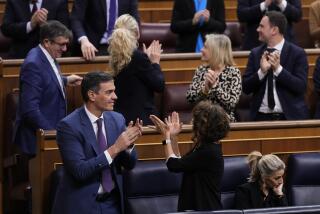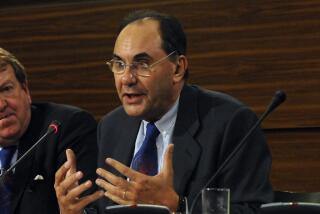Separatist backers disappointed as Catalonia’s regional leader stops short of declaring independence from Spain
Catalonia’s leader stopped short Tuesday of an outright independence declaration for the region in northeastern Spain, instead charting a course that seemingly satisfied neither his separatist base nor the central government in Madrid.
The Catalonia confrontation, Spain’s worst political crisis in decades, pits breakaway-minded leaders in the wealthy region against the Madrid government, which has warned of harsh but unspecified measures if the independence bid goes forward.
In a much-anticipated speech to the regional parliament, Carles Puigdemont, Catalonia’s president, called for a temporary suspension of the results of Catalonia’s Oct. 1 referendum vote favoring independence, even while making clear his belief that the region is on the road to secession from Spain.
Catalonia “has the right to become independent,” Puigdemont declared to cheers from lawmakers. “The ballots have said ‘yes’ to independence, and that’s what I am committed to follow.”
But directly addressing the Madrid government, he appealed for dialogue, saying: “We hope this can be solved easily and peacefully.”
Madrid swiftly signaled that was unlikely. Spain’s deputy prime minister, Soraya Saenz de Santamaria, said the government would make a formal response Wednesday, but she again sharply contested the referendum’s legality.
“Neither Mr. Puigdemont nor anyone else can reach conclusions based on a law that does not exist,” she said.
Spain’s Constitutional Court had previously struck down the regional laws on which Catalan officials said the balloting was based.
Spain called an emergency Cabinet meeting for Wednesday, and Prime Minister Mariano Rajoy was scheduled to address the Spanish parliament afterward.
Catalonia, a region of about 7.5 million residents, has its own language and culture that were repressed during the nearly 40-year dictatorship of Gen. Francisco Franco, who died in 1975.
In the referendum this month, about 90% of the nearly 2.3 million votes cast were in favor of independence, and about 8% were against, according to the Catalan regional government. Officials said the region has about 5.3 million registered voters, meaning fewer than half went to the polls.
In Barcelona, Catalonia’s regional capital, some supporters of independence watched Puigdemont’s speech on huge screens, wrapping themselves in Catalan flags. As the full import of his remarks became clear, many were crestfallen, some wiping away tears.
“I think people who voted ‘yes’ on the 1st of October — people who went there and were hit by the police — they want a ‘yes’ now,” said Alessia Martinez, 19, a college student studying chemistry in Barcelona. “We don’t want to speak to the Spanish government. They had some chances before. Now it’s too late.”
The issue has enormous emotional and political resonance in Spain, which spent years confronting a sometimes-bloody Basque separatist movement and views the Catalonia independence bid as something approaching an existential crisis.
Within Catalonia, there’s been polarization as well. Pro-unity protesters turned out by the hundreds of thousands over the weekend.
The European Union, already embroiled in a messy divorce from Britain, has watched the unfolding drama with apprehension. The bloc is reluctant to meddle in internal affairs of its member states, and few EU governments have any interest in encouraging secessionists in other countries, lest that be seen as an open invitation to breakaway movements within their own borders.
Analysts said Puigdemont’s call for conciliation might not stave off a sharp reaction from the Madrid government, which has a range of options at its disposal. It could invoke an article of the Spanish Constitution and move to take over the region administratively, or even jail separatist leaders.
“Puigdemont has chosen to buy some time. He wants dialogue,” said Xavier Arbos, a constitutional law expert based in Barcelona. “But I don’t think it will result in conversations with Mr. Rajoy, who is — to say it plainly — quite fed up with the Catalan problem.”
Some of Puigdemont’s allies, too, were disappointed — even though after his speech, the Catalan government issued photos of a document signed by him that some lawmakers in his coalition referred to as an independence declaration.
“This was not a declaration of independence. Confidence in the Catalan government has been damaged,” said Quim Arrufat, a spokesman for the far-left separatist party CUP. “We will not allow this term to end without the application of the results of the referendum.”
Special correspondent Frayer reported from Barcelona and Times staff writer King from Washington.
UPDATES:
3:55 p.m.: This article was updated with additional reaction to the speech by Carles Puigdemont.
12:30 p.m.: This article was updated with additional information on the referendum.
11:20 a.m.: This article was updated with quotes from the speech by Carles Puigdemont, Catalonia’s president, and other details.
10:05 a.m.: This article was updated throughout with Times reporting.
This article was originally published at 8:05 a.m.
More to Read
Start your day right
Sign up for Essential California for news, features and recommendations from the L.A. Times and beyond in your inbox six days a week.
You may occasionally receive promotional content from the Los Angeles Times.






